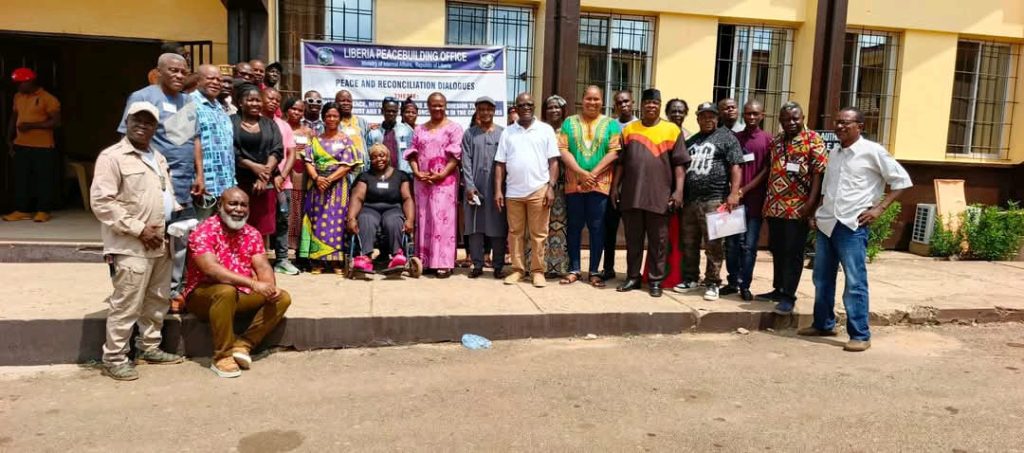The Liberia Peacebuilding Office, in partnership with the Ministry of Internal Affairs and supported by the United Nations Development Program (UNDP), convened a three-day Peace and Reconciliation Dialogue in Gbarnga, Bong County. Established in 2009, the Liberia Peacebuilding Office has been instrumental in supporting the Liberian government’s development and implementation of peacebuilding and reconciliation initiatives throughout the nation. This particular dialogue represents a continuation of the office’s efforts to foster sustainable peace and development across several key counties. The event aimed to address existing conflicts, promote cooperation, and build the foundation for peaceful and inclusive elections in 2029.
The dialogue was formally opened by Liberia’s Peace Ambassador, Eric Quaqua, who stressed the importance of non-violence, the rejection of hate speech, and upholding the rule of law. Recalling a previous Political Reconciliation Dialogue held in March 2024, Ambassador Quaqua emphasized the need to break cycles of violence and facilitate post-traumatic reconciliation in Bong, Grand Bassa, Lofa, and Grand Gedeh Counties. He encouraged participants to actively engage in the dialogue as a primary means of conflict resolution and peacebuilding. The ambassador highlighted that the dialogue’s core objective is to strengthen political and community cooperation, fostering an environment of peace and reconciliation essential for sustainable development. He further reiterated the importance of the dialogue in developing strategies for maintaining peace and ensuring free, fair, and successful elections in 2029, noting that similar dialogues had already been conducted in Grand Gedeh and Grand Bassa Counties, with Lofa County next on the schedule.
Elizabeth Sumo, a Project Officer representing the UNDP Country Representative, commended the Liberia Peacebuilding Office and the Ministry of Internal Affairs for organizing the dialogue. She expressed her belief that this initiative would contribute significantly to the peace process and foster development within the country. Ms. Sumo reinforced the UNDP’s ongoing commitment to supporting peacebuilding efforts in Liberia, underscoring the organization’s dedication to collaborative initiatives that promote stability and progress. This support aligns with the UNDP’s broader mandate of promoting sustainable development and peaceful coexistence within nations facing complex challenges.
William Jallah, Assistant Minister for Cultural Affairs at the Ministry of Internal Affairs, acknowledged the leadership of Bong County, headed by Superintendent Hawa Loleyah Norris, for the developmental progress made within the county. He underscored the significance of maintaining peace within Bong County and Liberia as a whole, highlighting the crucial role peace plays in facilitating development and progress. Minister Jallah reiterated the commitment of the Ministry of Internal Affairs, in collaboration with the Liberia Peacebuilding Office and the UNDP, to institutionalize such dialogues in targeted counties across Liberia, demonstrating a proactive approach to conflict prevention and peace consolidation.
Bong County Superintendent Hawa Loleyah Norris expressed gratitude to the Liberia Peacebuilding Office and its partners for initiating the dialogue in her county. She urged participants to actively engage with the facilitators and absorb new knowledge that could contribute to the rebuilding process in both Bong County and Liberia at large. Superintendent Norris acknowledged that Bong County had lagged behind in development for an extended period and emphasized the need for collective effort and unity among its citizens to propel progress. She leveraged the platform to call upon the county’s youth to embrace dialogue as a means of resolving conflicts, advocating for peaceful resolution over violence. This call to action highlights the importance of engaging youth in peacebuilding processes and empowering them as agents of change within their communities.
The three-day dialogue brought together diverse stakeholders, including representatives from civil society organizations, traditional and religious leaders, youth groups, persons with disabilities, women’s groups, and the Joint Security forces. This inclusive approach ensured representation from various segments of society, reflecting a commitment to incorporating diverse perspectives in the peacebuilding process. The theme of the dialogue, “Enhancing Peace, Reconciliation, and Social Cohesion Through Building Civic Trust and Fostering Reconciliation in Communities,” encapsulated the overall objective of the initiative, emphasizing the importance of trust-building and community-level reconciliation as essential components of sustainable peace. This thematic focus reflects a comprehensive approach to peacebuilding that recognizes the interconnectedness of various social, political, and economic factors.














